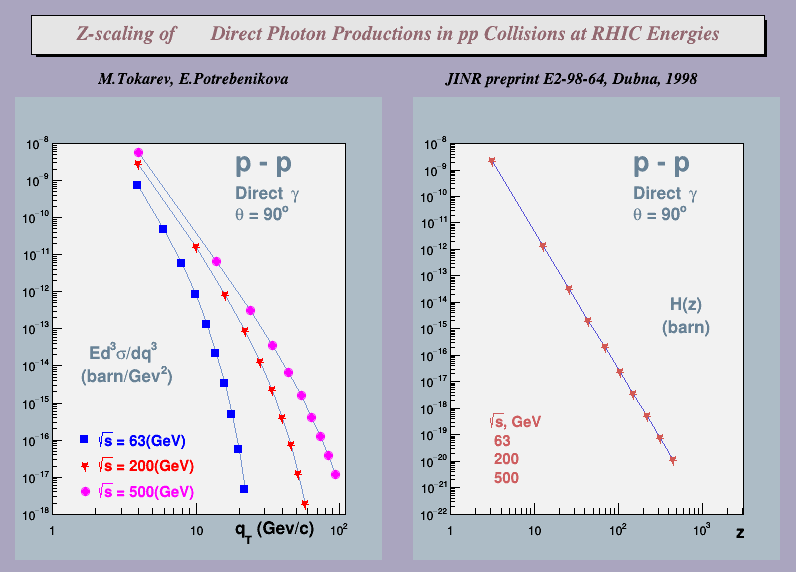This macro is an example of graphs in log scales with annotations.
The presented results are predictions of invariant cross-section of Direct Photons produced at RHIC energies, based on the universality of scaling function H(z).
These Figures were published in JINR preprint E2-98-64, Dubna, 1998 and submitted to CPC.
Note that the way greek symbols, super/subscripts are obtained illustrate the current limitations of Root in this area.
{
"Monte Carlo Study of Z scaling",10,40,800,600);
Direct Photon Productions in pp Collisions at RHIC Energies","br");
t->
DrawLatex(3.1,15.5,
"M.Tokarev, E.Potrebenikova ");
t->
DrawLatex(14.,15.5,
"JINR preprint E2-98-64, Dubna, 1998 ");
TPad *pad1 =
new TPad(
"pad1",
"This is pad1",0.02,0.02,0.48,0.83,33);
TPad *pad2 =
new TPad(
"pad2",
"This is pad2",0.52,0.02,0.98,0.83,33);
energ = 63;
dens = 1.766;
tgrad = 90.;
ptmin = 4.;
ptmax = 24.;
delp = 2.;
hz_calc(energ, dens, tgrad, ptmin, ptmax, delp);
pad1->
Range(-0.255174,-19.25,2.29657,-6.75);
t->
DrawLatex(0.20,0.45,
"Ed^{3}#sigma/dq^{3}");
t->
DrawLatex(0.22,0.260,
"#sqrt{s} = 63(GeV)");
t->
DrawLatex(0.22,0.205,
"#sqrt{s} = 200(GeV)");
t->
DrawLatex(0.22,0.15,
"#sqrt{s} = 500(GeV)");
energ = 200;
dens = 2.25;
tgrad = 90.;
ptmin = 4.;
ptmax = 64.;
delp = 6.;
hz_calc(energ, dens, tgrad, ptmin, ptmax, delp);
energ = 500;
dens = 2.73;
tgrad = 90.;
ptmin = 4.;
ptmax = 104.;
delp = 10.;
hz_calc(energ, dens, tgrad, ptmin, ptmax, delp);
graph =
new TGraph(1,dum,dum);
graph =
new TGraph(1,dum,dum);
pad2->
Range(-0.43642,-23.75,3.92778,-6.25);
}
{
Float_t EB1, EB2, PB1, PB2, MB1, MB2, M1, M2;
Float_t Y1X1, Y1X2, Y2X1, Y2X2, Y2X1X2, Y1X1X2;
DNDETA= DENS;
MB1 = MN*A1;
MB2 = MN*A2;
EB1 = ENERG/2.*A1;
EB2 = ENERG/2.*A2;
M1 = GM1;
M2 = GM2;
NLOOP = (PTMAX-PTMIN)/DELP;
ETOT =
sqrt(M1*M1 + PTOT*PTOT);
PB1 =
sqrt(EB1*EB1 - MB1*MB1);
PB2 =
sqrt(EB2*EB2 - MB2*MB2);
P2P3 = EB2*ETOT+PB2*PTOT*
cos(THET);
P1P2 = EB2*EB1+PB2*PB1;
P1P3 = EB1*ETOT-PB1*PTOT*
cos(THET);
X1 = P2P3/P1P2;
X2 = P1P3/P1P2;
Y1 = X1+
sqrt(X1*X2*(1.-X1)/(1.-X2));
Y2 = X2+
sqrt(X1*X2*(1.-X2)/(1.-X1));
S = (MB1*MB1)+2.*P1P2+(MB2*MB2);
SMIN = 4.*((MB1*MB1)*(X1*X1) +2.*X1*X2*P1P2+(MB2*MB2)*(X2*X2));
SX1 = 4.*( 2*(MB1*MB1)*X1+2*X2*P1P2);
SX2 = 4.*( 2*(MB2*MB2)*X2+2*X1*P1P2);
SX1X2= 4.*(2*P1P2);
DELM =
pow((1.-Y1)*(1.-Y2),ALX);
Z[
I] =
sqrt(SMIN)/DELM/
pow(DNDETA,BETA);
Y1X1 = 1. +X2*(1-2.*
X1)/(2.*(Y1-X1)*(1.-
X2));
Y1X2 = X1*(1-
X1)/(2.*(Y1-X1)*(1.-
X2)*(1.-X2));
Y2X1 = X2*(1-
X2)/(2.*(Y2-X2)*(1.-
X1)*(1.-X1));
Y2X2 = 1. +X1*(1-2.*
X2)/(2.*(Y2-X2)*(1.-
X1));
Y2X1X2= Y2X1*( (1.-2.*
X2)/(X2*(1-X2)) -( Y2X2-1.)/(Y2-
X2));
Y1X1X2= Y1X2*( (1.-2.*
X1)/(X1*(1-X1)) -( Y1X1-1.)/(Y1-
X1));
KX1=-DELM*(Y1X1*ALX/(1.-
Y1) + Y2X1*ALX/(1.-Y2));
KX2=-DELM*(Y2X2*ALX/(1.-
Y2) + Y1X2*ALX/(1.-Y1));
ZX1=Z[
I]*(SX1/(2.*SMIN)-KX1/DELM);
ZX2=Z[
I]*(SX2/(2.*SMIN)-KX2/DELM);
H1=ZX1*ZX2;
INVSIG[
I]=(HZ[
I]*H1*16.)/
S;
}
}


